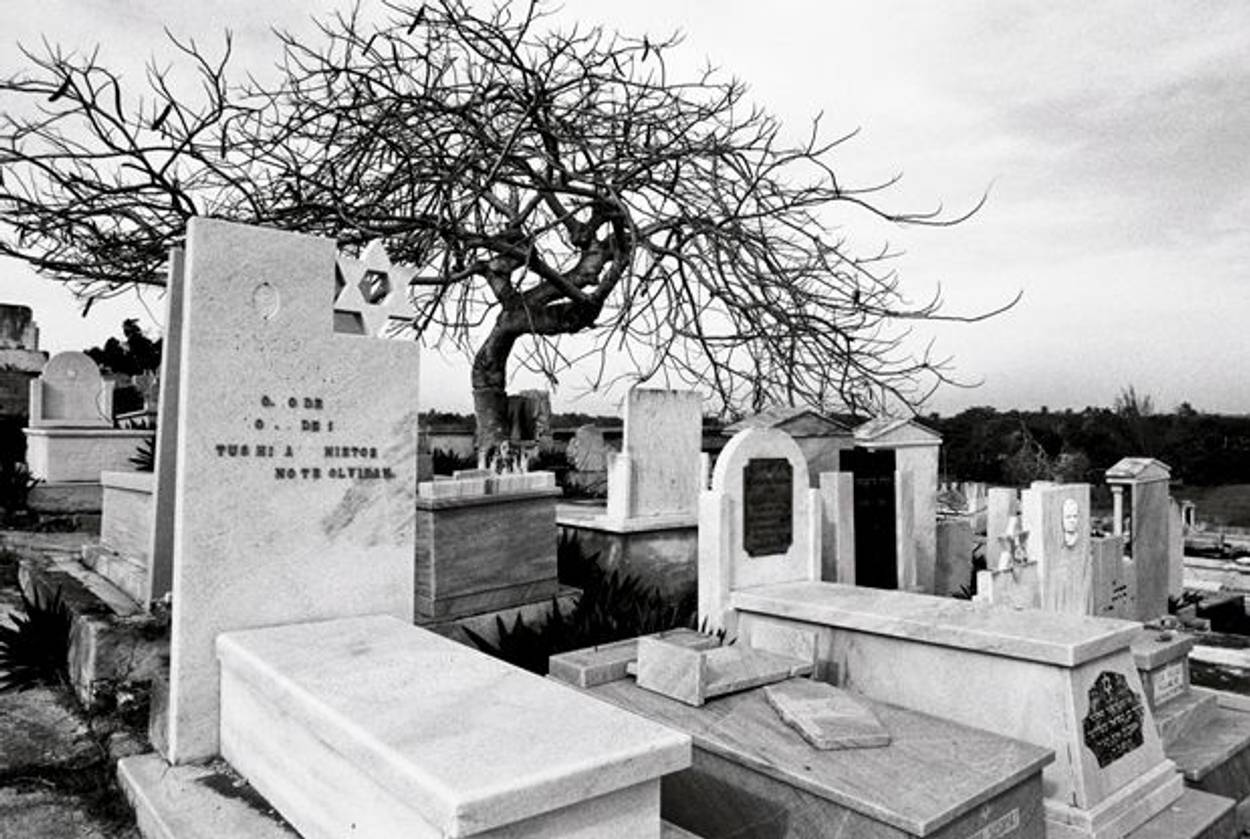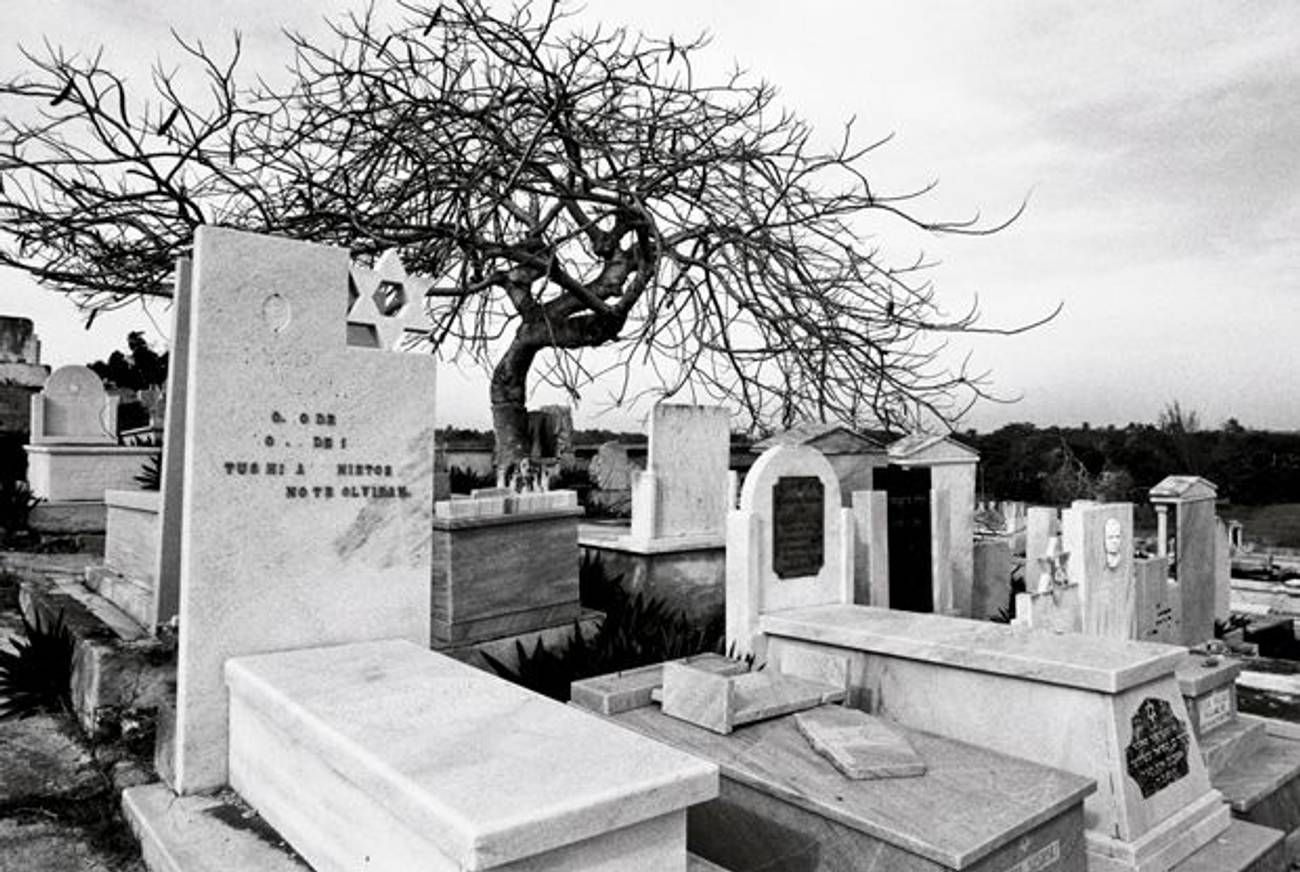My Man in Havana
When we fled Cuba in 1962, my uncle stayed. He died 50 years later, without ever explaining his decision.




My uncle died recently in Havana.
I knew a few things about him: He was an atheist, an idealist, clever, quiet and serious, tall and guapo. But the most important thing, in terms of our family history, is that he was known to us as “the communist.”
I didn’t really know him personally: The stranger holding me in faded black-and-white baby photos taken before my family left Cuba in 1962 was an enigma. My father rarely spoke of him, the brother who stayed behind after the communist revolution. On the few occasions when I met my uncle in person, he revealed little about himself—why he stayed, whether his politics had changed, or how he endured five decades under Castro’s regime, separated from his parents, his brother, his nieces.
I assumed that as a communist, he’d disavowed his Judaism, marrying two gentile women, and raising his children without religion. Yet he hadn’t left his identity behind completely. In his final days, suffering from terminal cancer, he asked to be buried in Havana’s Jewish cemetery.
Nobody in my family attended the funeral. It would have been impossible to get the necessary papers and visas approved immediately. But my dad wouldn’t have gone anyway; he has never returned to Cuba. My dad sat shiva privately, at home in Brooklyn. He didn’t want to rehash his past, or to talk about his brother. He chose silence.
My uncle had long done the same. Now, with his passing, any chance I had of learning more about his side of our family story has vanished forever.
I grew up absorbing my dad’s memories and strong anti-communist opinions about Cuba. My mom, who fled with him in 1962, confirmed facts and added her own conjectures. Our refugee relatives shared similar sentiments during family gatherings, bashing Castro’s regime and those who stayed behind—including their own relatives.
From my uncle, there was silence. He stayed in Cuba in 1962, when 90 percent of the Jewish community—once numbering 15,000—left after the revolution. My dad heard little from his brother for nearly four decades. I witnessed my parents’ attempts at contact: unanswered letters, dollars delivered via messengers, a rare crackling phone call. We don’t know what happened on the other end. I mostly forgot that I had an uncle in Cuba, along with his first wife, then his second wife, and his children—my three cousins.
Eventually, though, something shifted politically, and a slit of communication opened. My mother’s sister braved a legal visit to Cuba in 1997 and saw my uncle. One of my Cuban cousins procured access to limited email; I connected with him and we began stilted conversations. My familial curiosity was piqued and I craved more. I dared speak aloud about going there, but my father quelled that desire, reminding me of risks, dangers, fears.
I had met my uncle only three times after my exodus from Cuba as an infant. The first was here in 2001. Restrictions between the United States and Cuba eased slightly, and my father made what seemed miraculous to me happen: He brought his brother and sister-in-law for a two-month visit to Brooklyn by fully sponsoring them, including visas, travel expenses, and the long stay in their home. That’s the only way this visit could transpire, since they, like most Cubans, did not have the means for travel. The brothers had not seen each other since 1962.
At 40, I was eager to see him, embarrassed and awkward speaking Spanish with my uncle, knowing little about this stranger who looked exactly like my grandfather. We made light conversation, touching only on easy topics. The air was filled with tension on my parents’ porch in Brooklyn; the rift of 39 years of geographical and emotional distance was impossible to broach, let alone heal. I watched my parents host graciously on the surface even as they seethed within. Too many questions and assumptions went unasked or unanswered. Did he receive our letters? Was he unable to respond? Why didn’t he react to news of his parents’ deaths? Why didn’t he leave when we did? Did he stay because he believed in Fidel’s vision—and did he still believe in it? Did he hate Judaism, resent his parents, miss his brother? Did he regret his life decisions?
Arguments and resentments waiting to be ignited were kept unlit, except when my dad suddenly erupted once, unable to hold back his frustration at my uncle’s silence, at his lack of emotion or reaction about his parents’ passing or toward his Judaism. My dad wanted a discussion, but my uncle kept quiet. I felt caught between loyalty and respect for my parents’ feelings and intense curiosity about my uncle’s biography of the last four decades. I satisfied myself with small talk and affectionate smiles, resigned to this, more than I could have ever imagined sharing with him.
I met my uncle a second time in Havana in December 2008, on the eve of the 50th anniversary of the revolution. I had been campaigning for two years to get to my birthplace; I needed one or both of my parents to come and narrate their memories for me. My dad said my mom, my sister, and I could go. I signed us up on a week-long Jewish humanitarian mission to Cuba. We filled out and paid for countless American and Cuban applications and forms. My mother graciously financed my travel expenses. We collected basic goods sorely needed by the communities we’d visit, and for our family who lacked so much. My aunt and uncle in Havana were permitted to join us at some restaurants and visit our hotel room, a relatively new freedom for Cubans at that time. We left our group to spend two days of quality time with them, to be able to talk privately. My dad had repeatedly warned me against talking about anything within hearing distance of anyone. He cautioned us to distrust everyone and not to mention his name. His fear was very real and contagious. I fought it, displaying false bravado.
My uncle picked us up in his ancient car to drive us to nostalgic sites my mom wanted to see. He took us to ride la lancha, the ferry, to the now-dilapidated home where she grew up in Regla. He knocked on the door of the apartment she once shared with my dad and me in the formerly upscale Vedado neighborhood and asked its inhabitants to let us in. He took us to the venerable University of Havana, where my parents studied before its doors were closed by the revolution. We traversed broken cobblestone streets to get to my uncle’s house for a modest meal. We hired a driver for a day trip with my uncle and aunt to dip into the near mythical blue waters of Varadero beach.
I gained small insights into my uncle’s life when I saw his home on a backward city street where chickens roamed freely. He was attentive to us, giving us a tour of his modest orderly household and showing us one family album. He was handy, as Cubans must be, fixing things that are beyond repair. I tentatively asked him questions that would elucidate his past for me. He laughed uneasily at my desire to get information I craved, avoiding answers. He mentioned government rations and help from the Jewish community center. Our shared Hanukkah meal consisted of food homemade from ingredients from the ration line and from the hard currency market, and “luxury” imported items donated by overseas Jewish communities. I asked to see the ration book, but it couldn’t be found.
Our third reunion was in Israel in July 2010, when my uncle visited his son who had made aliyah. My uncle was ill; time was running out. I had emailed him a copy of notes I’d gathered from interviews with my dad about their early days, before the revolution, when the brothers were growing up in a rural town east of Havana. My uncle, who worked as an accountant until he retired, remembered numbers: their home address, dates. He corrected facts but didn’t elaborate. He offered a tidbit about the “special period,” the years after Soviet communism fell and Cuba was bereft of critical support; he spoke about losing 30 pounds and his family practically starving during those years. Then he clammed up again. I don’t know if 50 years under communist rule made him cautious about saying anything that could possibly incriminate his family or whether he was a true believer in the system until he died. Now I will never know.
In the short exposures I had to my uncle, I felt a visceral blood connection, loyalty to my father and conflicting emotions of love, betrayal, and curiosity. He touched my soul when he smiled at me affectionately and called me sobrina. As I hugged him goodbye at the end of each of our three visits I cried, feeling a sad sense of impending loss. I hadn’t done enough, having started too late, conversing with him cautiously instead of risking our pleasant contact with tough questions. Were we separated by the wall of political difference between two countries and two brothers, or was it simply naturally opposing personalities and geographical distance that kept us from knowing each other?
Maybe my uncle didn’t want me to know who he really was, or what he believed; perhaps he didn’t want to openly challenge my father’s views, or maybe he never wanted to connect with any of us gusanos who abandoned him—it may have been dangerous for him to do so. Or, perhaps it was too late for a closed person like him to open up. Does it really matter anymore? Can I let him go now?
Since my uncle died, I have tried to balance love for my dad and respect for his intense disagreement with his brother’s life choices, trying to picture how my uncle may have felt. While I believe my dad’s hurt is valid, and though I will never have all the facts, I can still try to imagine my uncle’s viewpoint as an idealist and as one left behind. Removed by a generation from this conflict, I can accept him despite his attached labels: communist, atheist, intermarried. I may not have truly known or understood him, but I will always love him simply for being the uncle who held me with affection as a baby.
Miriam B. Abrahams reviews books for Jewish Book World, and is currently writing about her immigrant family’s experiences.